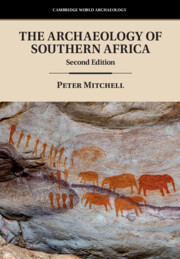Book contents
- Frontmatter
- Contents
- List of Figures
- List of Tables
- Acknowledgments
- 1 Introduction
- 2 Frameworks
- 3 Contexts
- 4 Origins
- 5 A Cognitive Revolution
- 6 Hunter-Gatherers of the Late Pleistocene
- 7 Archaeologies of the Pleistocene/Holocene Transition
- 8 Hunting, Gathering, Intensifying: Forager Histories in the Holocene before 2000bp
- 9 Taking Stock: Herders and Hunter-Gatherers
- 10 Farmers and Foragers: the First Millennium
- 11 Forming States: the Zimbabwe Culture and its Neighbours
- 12 Recent Farmers and Hunter-Gatherers in Southernmost Africa
- 13 Colonisation, Conquest, Resistance
- 14 Perspectives and Prospects
- Glossary
- References
- Index
5 - A Cognitive Revolution
Published online by Cambridge University Press: 15 May 2024
- Frontmatter
- Contents
- List of Figures
- List of Tables
- Acknowledgments
- 1 Introduction
- 2 Frameworks
- 3 Contexts
- 4 Origins
- 5 A Cognitive Revolution
- 6 Hunter-Gatherers of the Late Pleistocene
- 7 Archaeologies of the Pleistocene/Holocene Transition
- 8 Hunting, Gathering, Intensifying: Forager Histories in the Holocene before 2000bp
- 9 Taking Stock: Herders and Hunter-Gatherers
- 10 Farmers and Foragers: the First Millennium
- 11 Forming States: the Zimbabwe Culture and its Neighbours
- 12 Recent Farmers and Hunter-Gatherers in Southernmost Africa
- 13 Colonisation, Conquest, Resistance
- 14 Perspectives and Prospects
- Glossary
- References
- Index
Summary
This chapter looks at the profound advances made over the past two decades or so in our understanding of modern human origins, of how humans lived in southern Africa during Marine Isotope Stages 6−4, and of their cognitive capacities. While genetics and palaeontology cannot establish a central role for southern Africa in H. sapiens’ emergence, the region provides the most detailed early evidence anywhere for a wide range of complex behaviours that speak to the cognitive abilities of those responsible for them: art, jewellery, bone tools, archery, pigment manufacture, pyrotechnology, snaring and trapping of small game, etc. Much of this material is associated with the Still Bay and Howiesons Poort industries and the significance of this is discussed along with how southern Africa’s record relates to the wider Palaeolithic context in Africa and Eurasia. While underlining the importance of sites like Blombos, Border Cave, Klasies River, Pinnacle Point, and Sibhudu, the chapter emphasises the limitations of (near-)coastal/Fynbos Biome-oriented research and the increasing importance of fieldwork in other regions, such as Namaqualand, the southern Kalahari, and highland Lesotho.
Keywords
- Type
- Chapter
- Information
- The Archaeology of Southern Africa , pp. 85 - 124Publisher: Cambridge University PressPrint publication year: 2024



